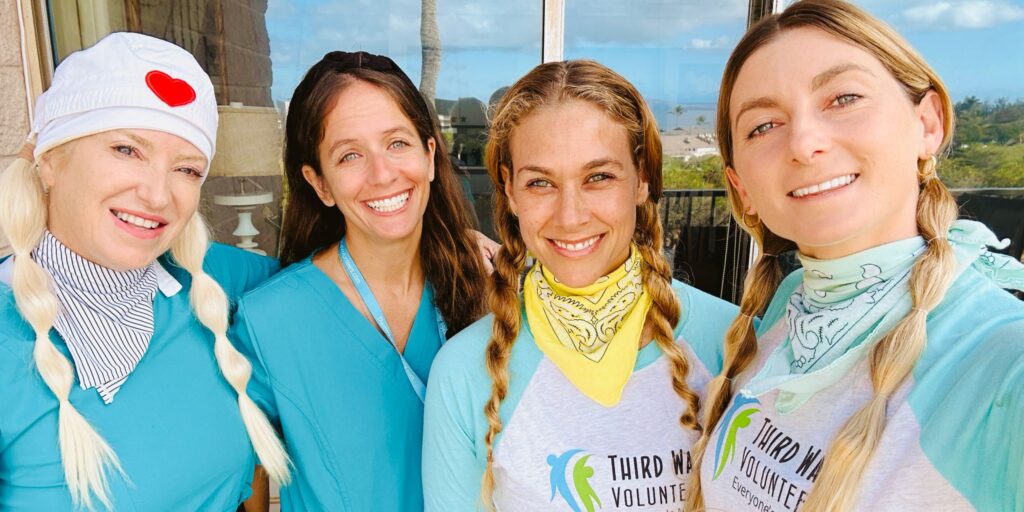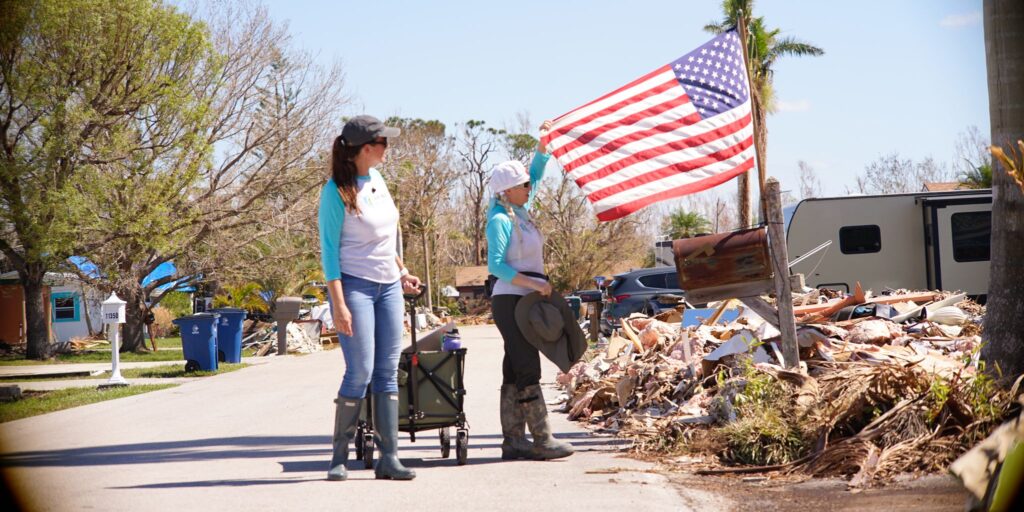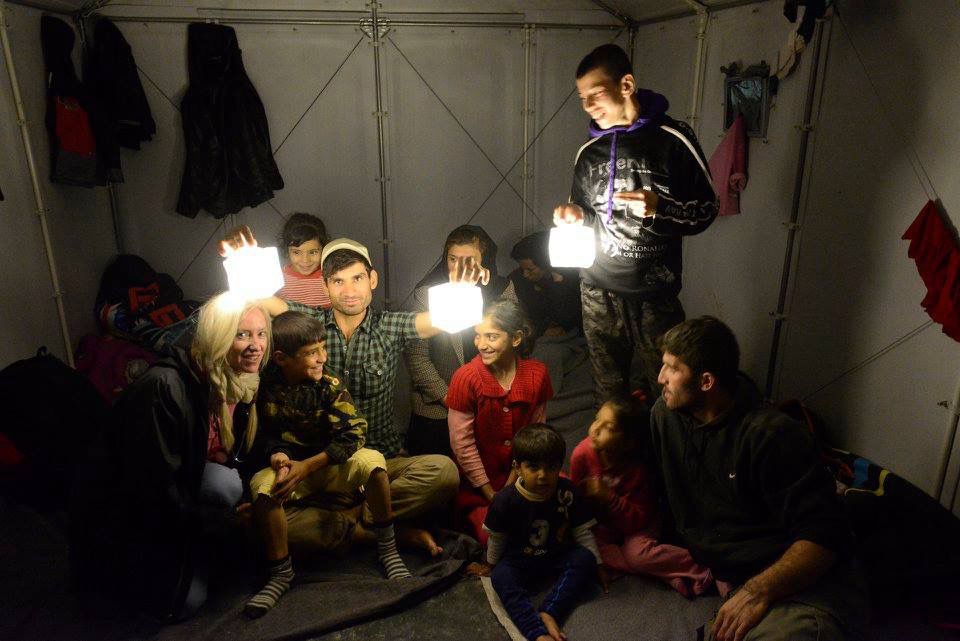Alison Thompson is a first responder, volunteer leader, and full-time volunteer. The founder and executive director of Third Wave Volunteers, she has been on the ground responding to humanitarian disasters and crises all over the world, including frequently working alongside Team Rubicon Greyshirts and international volunteers.
“I’ve kind of been with Team Rubicon from the beginning,” says Thompson, who first met Team Rubicon co-founder Jake Wood in Haiti on the inaugural 2010 earthquake response operation that launched the veteran-led organization. “I know you work the same way I work.”
That way is “from the ground up,” where Thompson says all successful disaster response begins, echoing a phrase common at Team Rubicon: All disasters begin and end locally. Local is where the disaster happens, and effective volunteerism must start, she explained at a Team Rubicon forum for humanitarians in March. “This is the way the future works—from the grassroots.”

Thompson spoke at Team Rubicon’s monthly Professional Learning Series, a regular seminar featuring experts in philanthropy and nonprofit work from around the world, where she addressed the importance of “on-the-ground knowledge” in successful humanitarian interventions, a tactic embraced by Team Rubicon that informs how and where international volunteers will respond, and that she believes is a significant factor behind the success of veteran-led volunteerism.
A preacher’s daughter who grew up in and around missions throughout Asia, Thompson has been an altruist her whole life. A nurse and math teacher turned documentary filmmaker and nonprofit director, her humanitarian work spans the mundane to the extraordinary. She has been recognized several times for her service to communities in need—including being awarded the prestigious Order of Australia by Queen Elizabeth II, the highest possible civilian award presented to Australian citizens for outstanding achievements and meritorious service. A lifetime of traveling the world in charitable service to underserved communities led her to conclude that “They keep responding after the fact,” said Thompson, “but it doesn’t need to be like that.”
The key to being most helpful after a disaster is harnessing local knowledge and resources, like volunteers, which happens best before a disaster.
“We need to keep building resilient communities,” she says, “which happens through local connections, from the grassroots, and through staying long term.”
It’s something Team Rubicon is already doing, Thompson says. As a local organization with international reach, Team Rubicon has become part of communities across the globe, leveraging local volunteers and community leaders to deliver the most significant impact and build resiliency. There are Greyshirt volunteers in every U.S. state, as well as U.S. territories Puerto Rico and Guam, leading Team Rubicon’s response efforts to disasters that may strike in their communities. Internationally, it partners with the World Health Organization, NGOs, INGOs, and, most importantly, local community leaders.
“It’s so easy to be at the wrong place at the wrong time,” says Thompson of much disaster response, “but it’s leadership to be in the wrong place at the right time.”
And there are many wrong places to be. “Disaster response organizations, like Third Wave Volunteers, used to do one big disaster a year,” she says. A visit to the Space Force Headquarters enlightened her, where she learned a statistic familiar to Team Rubicon volunteers and staff: there was a billion-dollar disaster every week in 2023. “Now we have to choose where to go; we can’t be everywhere. We’re overwhelmed. All the NGOs are.”

Governments are frequently overwhelmed as well, Thompson elaborated, and disasters can bring the biggest and best-funded agencies to heel. “Look at Hurricane Sandy, five states; billions of dollars in damage. New York couldn’t handle it—they needed help.” If even wealthy New York City needs assistance after a disaster, posits Thompson, the relentless pace of disasters around the world ensures that most local governments will not meet the needs of survivors without marshaling their own resources and citizens effectively.
Thompson also says that governments can hobble themselves with onerous bureaucracy, often stymieing the transmission of critical knowledge between locals and those trying to help, which obstructs or delays aid to the community. After the 2004 Indian Ocean earthquake and tsunami, where more than 200,000 people died, survivors faced critical water, sanitation, and hygiene issues. As Thompson’s team of Third Wave volunteers went in to help build public toilets, she watched organizations struggle through the administrative system.
“Sometimes, it means writing dozens of emails before getting permission to build a toilet. And by then, disease has broken out,” Thompson reflected.
Her approach is preemptive, holistic, and predicated on a whole-community strategy, enlisting local volunteers to identify the need and local or international resources to fill the gaps in available care, and maintaining a long-term presence. She says the key is to keep those resilient places working year-round and then check in on them regularly.
Proactive, grassroots disaster response emphasizes the importance of building sustainable communities, Thompson asserts, and maintaining a sustained presence in affected areas delivers results well beyond the immediate aftermath. “When we go into a community,” Thompson explains, “we stay long term, and that’s how we create resilient hubs. Instead of doing the work, leaving, and going to the next disaster.”
Through this model, Thompson says, working from the bottom up with local individuals and using local knowledge, humanitarians and international volunteers help build long-term resilience and assist vulnerable communities prepare for and withstand the next disaster they will face.




